Rear Brake Caliper Replacement without J55
Caution: Refer to Brake Dust Caution in the Preface section.
Caution: Refer to Brake Fluid Irritant Caution in the Preface section.
Notice: Refer to Brake Fluid Effects on Paint and Electrical Components Notice in the Preface section.
Removal Procedure
- Inspect the fluid level in the brake master cylinder reservoir.
- If the brake fluid level is midway between the maximum-full point and the minimum allowable level, no brake fluid needs to be removed from the reservoir before proceeding.
- If the brake fluid level is higher than midway between the maximum-full point and the minimum allowable level, remove brake fluid to the midway point before proceeding.
- Raise the vehicle and suitably support. Refer to Lifting and Jacking the Vehicle in General Information.
- Remove the tire and wheel assembly. Refer to Tire and Wheel Removal and Installation in Tires and Wheels.
- Pull down on the front park brake cable (3).
- Remove the front park brake cable from the park brake cable connector.
- Install a large C-clamp over the top of the brake caliper housing and against the back of the outboard brake pad.
- Remove brake hose to caliper bolt attaching the brake hose to the brake caliper.
- Remove the brake hose from the brake caliper.
- Remove and discard the 2 copper brake hose gaskets. These gaskets may be stuck to the brake caliper and/or the brake hose end.
- Plug the opening in the brake caliper and pipe to prevent fluid loss and/or contamination.
- Remove the park brake cable bracket (2) from the brake caliper (1).
- Disconnect the park brake cable from the park brake lever on the brake caliper.
- Remove the lower brake caliper pin bolt.
- Rotate the brake caliper up.
- Remove the brake caliper from the upper brake caliper pin bolt.
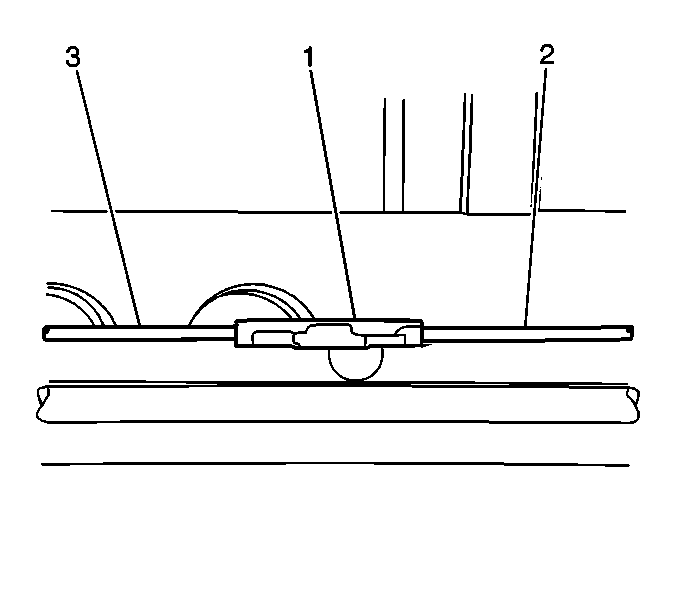
Notice: When using a large C-clamp to compress a caliper piston into a caliper bore of a caliper equipped with an integral park brake mechanism, do not exceed more than 1 mm (0.039 in) of piston travel. Exceeding this amount of piston travel will cause damage to the internal adjusting mechanism and/or the integral park brake mechanism.
| • | Compress the brake caliper piston into brake caliper bore to allow the piston enough clearance to slide the brake caliper off the brake rotor. |
| • | Remove the C-clamp. |
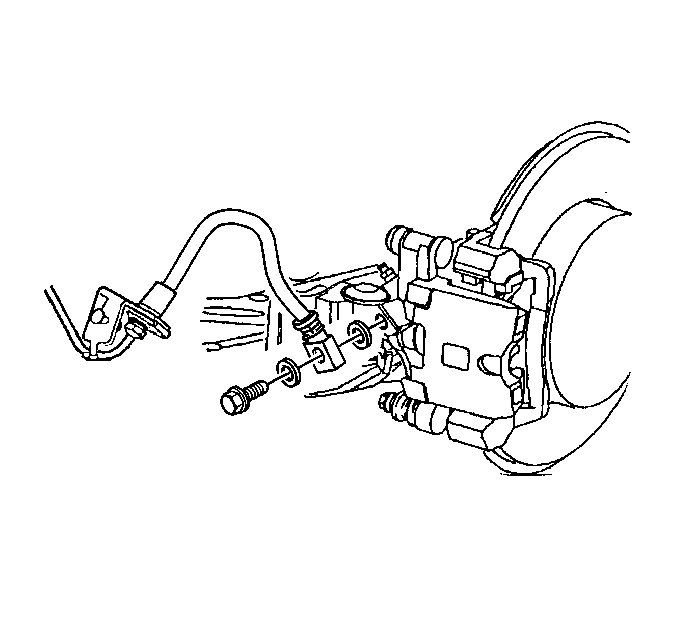
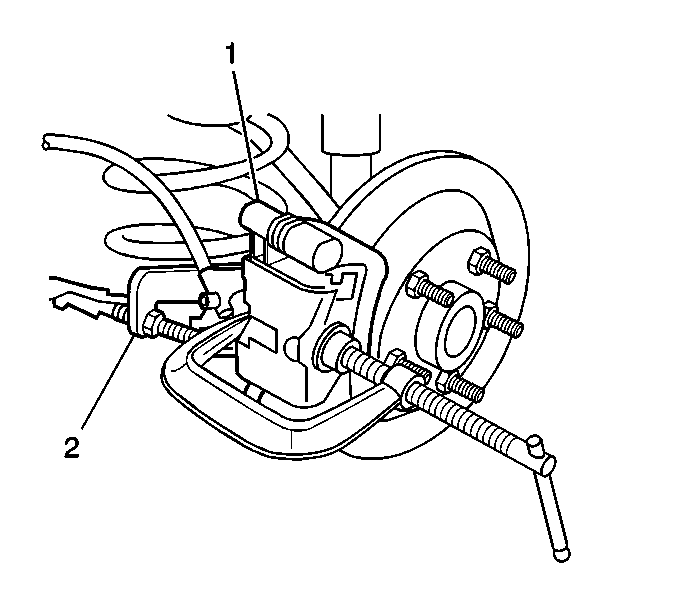
Leave the park brake cable attached to the cable bracket (2).
Installation Procedure
- If reusing the brake caliper retainers and sleeves, clean the sleeves using denatured alcohol, or equivalent.
- Apply a thin coat of high temperature silicone lube to the brake caliper retainers and sleeves.
- Install the brake caliper to the upper caliper pin bolt.
- Rotate the brake caliper down over the brake pads into the brake caliper bracket.
- Install the brake caliper pin bolts.
- Remove the plugs in the brake hose end.
- Assemble the brake hose bolt and the NEW copper brake hose gaskets to the brake hose.
- Install the brake hose to caliper bolt to the brake caliper.
- Connect the park brake cable to the park brake lever on the brake caliper.
- Install the park brake cable bracket (2) to the brake caliper (1).
- Install the front park brake cable (3) to the park brake cable connector (1).
- Bleed the brake system. Refer to Hydraulic Brake System Bleeding in Hydraulic Brakes.
- With the engine OFF, gradually apply the brake pedal to approximately 2/3 of its travel distance.
- Slowly release the brake pedal.
- Wait 15 seconds, then repeat steps 12-13 until a firm brake pedal apply is obtained; this will properly seat the brake caliper pistons and brake pads.
- Install the tire and wheel assembly. Refer to Tire and Wheel Removal and Installation in Tires and Wheels.
- Lower the vehicle.
Notice: Use the correct fastener in the correct location. Replacement fasteners must be the correct part number for that application. Fasteners requiring replacement or fasteners requiring the use of thread locking compound or sealant are identified in the service procedure. Do not use paints, lubricants, or corrosion inhibitors on fasteners or fastener joint surfaces unless specified. These coatings affect fastener torque and joint clamping force and may damage the fastener. Use the correct tightening sequence and specifications when installing fasteners in order to avoid damage to parts and systems.
Tighten
Tighten the brake caliper pin bolts to 26 N·m
(20 lb ft).
Important: Install NEW copper brake hose gaskets.

Tighten
Tighten the rear brake hose to caliper bolt to 45 N·m
(33 lb ft).

Tighten
Tighten the park brake cable bracket bolt to 43 N·m
(32 lb ft).

Rear Brake Caliper Replacement J55
Caution: Refer to Brake Dust Caution in the Preface section.
Caution: Refer to Brake Fluid Irritant Caution in the Preface section.
Notice: Refer to Brake Fluid Effects on Paint and Electrical Components Notice in the Preface section.
Removal Procedure
- Inspect the fluid level in the brake master cylinder reservoir.
- If the brake fluid level is midway between the maximum-full point and the minimum allowable level, no brake fluid needs to be removed from the reservoir before proceeding.
- If the brake fluid level is higher than midway between the maximum-full point and the minimum allowable level, remove brake fluid to the midway point before proceeding.
- Raise the vehicle and suitably support. Refer to Lifting and Jacking the Vehicle in General Information.
- Remove the tire and wheel assembly. Refer to Tire and Wheel Removal and Installation in Tires and Wheels.
- Install a large C-clamp over the top of the brake caliper housing and against the back of the outboard brake pad.
- Install a large C-clamp over the top of the caliper housing and against back of the outboard brake pad.
- Compress the brake caliper piston into brake caliper bore to allow the piston enough clearance to slide the brake caliper off the brake rotor.
- Remove the C-clamp from the brake caliper.
- Remove the brake hose to caliper bolt and plug the opening in the brake caliper and brake hose to prevent fluid loss and contamination.
- Remove the brake hose from the brake caliper.
- Remove and discard the 2 copper brake hose gaskets. These gaskets may be stuck to the brake caliper and/or the brake hose end.
- Remove the brake caliper pin bolts.
- Remove the brake caliper.
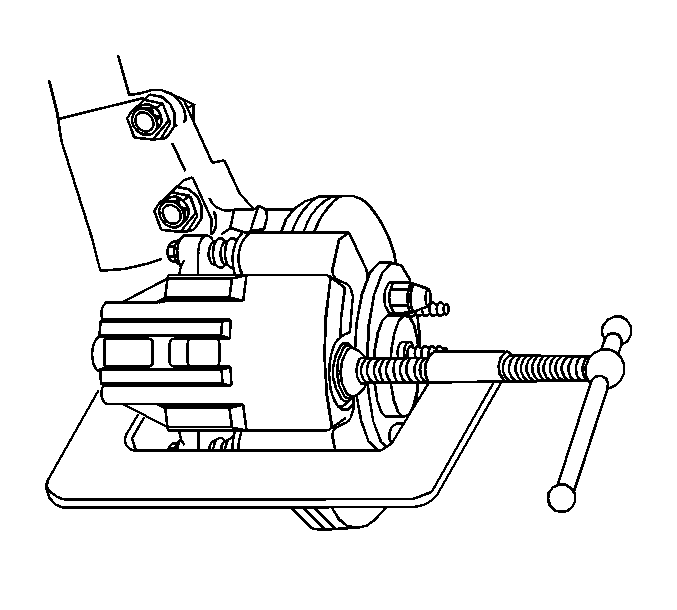
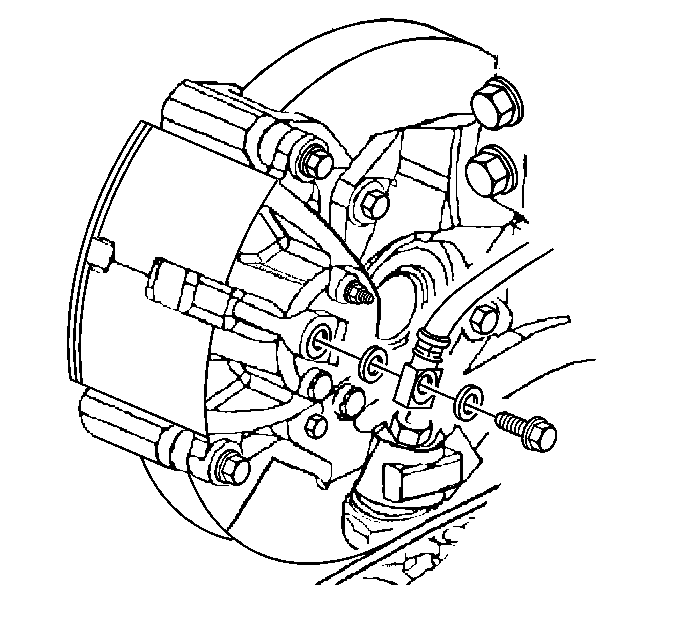
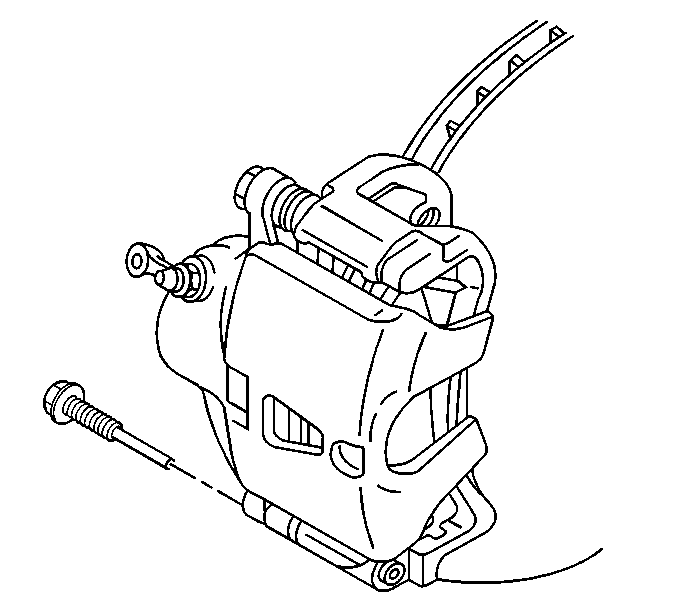
Installation Procedure
- If reusing the brake caliper retainers and sleeves, clean the sleeves using denatured alcohol, or equivalent.
- Apply a thin coat of hi temperature silicone lube to the brake caliper retainers and sleeves.
- Install the brake caliper over the brake pads and into the brake caliper bracket.
- Install the brake caliper pin bolts.
- Remove the plugs in the brake hose end.
- Assemble the brake hose bolt and the NEW copper brake hose gaskets to the brake hose.
- Install the brake hose to caliper bolt to the brake caliper.
- Bleed the brake system. Refer to Hydraulic Brake System Bleeding in Hydraulic Brakes.
- With the engine OFF, gradually apply the brake pedal to approximately 2/3 of its travel distance.
- Slowly release the brake pedal.
- Wait 15 seconds, then repeat steps 9-10 until a firm brake pedal apply is obtained; this will properly seat the brake caliper pistons and brake pads.
- Install the tire and wheel assembly. Refer to Tire and Wheel Removal and Installation in Tires and Wheels.
- Lower the vehicle.
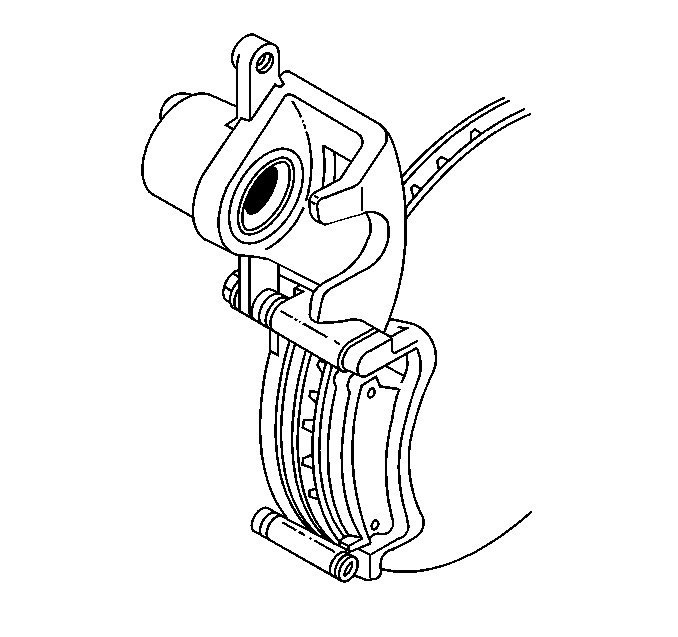
Notice: Use the correct fastener in the correct location. Replacement fasteners must be the correct part number for that application. Fasteners requiring replacement or fasteners requiring the use of thread locking compound or sealant are identified in the service procedure. Do not use paints, lubricants, or corrosion inhibitors on fasteners or fastener joint surfaces unless specified. These coatings affect fastener torque and joint clamping force and may damage the fastener. Use the correct tightening sequence and specifications when installing fasteners in order to avoid damage to parts and systems.

Tighten
Tighten the brake caliper pin bolts to 31 N·m
(23 lb ft).
Important: Install NEW copper brake hose gaskets.

Tighten
Tighten the brake hose to caliper bolt to 45 N·m
(33 lb ft).
